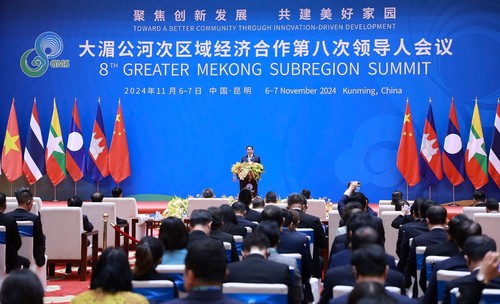 The 8th Greater Mekong Sub-region (GMS) Summit opened in Kunming city in China’s Yunnan province on November 7 The 8th Greater Mekong Sub-region (GMS) Summit opened in Kunming city in China’s Yunnan province on November 7 |
In his address, Prime Minister Pham Minh Chinh suggested that it is time for the GMS to focus on developing new-generation economic corridors centered on innovation, going beyond the traditional economic corridor model. Based on this, he proposed three key components of these new-generation economic corridors.
First, he said a corridor of technology and innovation should be built to foster multi-stakeholder, multi-sector, and multi-phase connectivity, focusing on supporting countries in addressing gaps in institutional frameworks, policies, technological capacity, and innovation resources, including human and financial resources.
Second, an economic growth corridor will revitalize traditional growth drivers while also fostering new ones.
Alongside infrastructure projects in transport, industrial production, and agriculture, the GMS should expand investments to create corridors in semiconductors, artificial intelligence, new materials, and clean energy, build digital platform, broaden the digital market, and improve digital skills for businesses and workers, he noted, adding that a substantial and effective transformation is needed to facilitate the smooth flow of capital, goods, and services within the GMS region.
Third, this should be a green, sustainable and inclusive corridor which ensures a balance between economic growth and environmental protection, with people put at the centre and being both the subject and the driving force, resource, and goal of development.
Prime Minister Chinh said: "Amid the current complicated global landscapes. We need to stay united and coordinate in responding to comprehensive, global, and regional challenges. With the perspective of valuing time, valuing intellect, and valuing unity and cooperation, we need to innovate to create breakthroughs, reach farther and integrate to move forward. I’m confidence and hope this summit will contribute to realizing the vision and goals of the GMS."
"I agree to adopt the GMS Innovation Strategy for Development 2030. Vietnam is committed continue to work closely with member countries and development partners to jointly build a GMS that is innovative, dynamic, and has sustainable and prosperous development,” said Prime Minister Pham Minh Chinh.
Prime Minister Chinh and other attending leaders adopted the Joint Statement and the GMS Innovation Strategy for Development 2030.
They also noted six documents related to climate and the environment, digitization, investment, gender equality, health care, and the digitalization of trade documents, which will be implemented in the coming time.